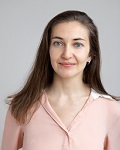2022
Anya Yermakova

Dissertation Abstract
"An Embodied History of Math and Logic in Russian-speaking Eurasia"
This dissertation is about logical pluralism, addressed through challenges to logical binarism (true/false), as well as to the binarism that logic itself holds in relation to embodied ways of knowing. The research is grounded in thought experiments in logic by logicians, scientists, artists, and other logically curious intellectuals in Russian-speaking Eurasia at the turn of the twentieth century, which have seldom
been jointly investigated. Together, these historic actors are shown to represent a loose “invisible college” of people united in exploring a more capacious conception of logic, with profound links to questions of performativity, non- discursive ways of knowing, and potential for radical experimentalism. Many of their logical experiments are seeing historiographic light for the first time; some have been deemed "nonclassical” by modern Western logic. This dissertation resists the historiographic convention to interpret these late-imperial texts along ontological binary divides between objectivity and subjectivity, psychologism and anti-psychologism, logical and extra-logical information. Instead, the actors are situated among dialogues about the future of the Russian Empire, and their logic-based objections to the general category of binarism are argued here to have been reflective of a tacit, shared understanding of logicality as a facilitator of a quieter revolution of methodological experimentalism. In a mimetic move, to both echo the historical actors’ undertakings and to bring them into relevance today, the later part of this dissertation takes on the challenge of enacting these logical possible worlds via embodied research in music and dance improvisation and composition by the author. Continuing history of science with sonic and movement-based methods furthers the epistemic ambition
evident in the archival materials—to explore logicality with dynamic, process-based atomic units of meaning. Additionally, expanding the historiographic toolkit to include embodied methods offers ways for studying gaps in the archive resulting from the events of the Soviet Revolution. Artistic research focused on the body as the original site of contradictions is thus shown to be a powerful tool both for
challenging normative assumptions of binarism, as well as for studying unfamous scientists and artists whose united explorations pushed the boundaries of knowledge and creativity.
This dissertation is about logical pluralism, addressed through challenges to logical binarism (true/false), as well as to the binarism that logic itself holds in relation to embodied ways of knowing. The research is grounded in thought experiments in logic by logicians, scientists, artists, and other logically curious intellectuals in Russian-speaking Eurasia at the turn of the twentieth century, which have seldom
been jointly investigated. Together, these historic actors are shown to represent a loose “invisible college” of people united in exploring a more capacious conception of logic, with profound links to questions of performativity, non- discursive ways of knowing, and potential for radical experimentalism. Many of their logical experiments are seeing historiographic light for the first time; some have been deemed "nonclassical” by modern Western logic. This dissertation resists the historiographic convention to interpret these late-imperial texts along ontological binary divides between objectivity and subjectivity, psychologism and anti-psychologism, logical and extra-logical information. Instead, the actors are situated among dialogues about the future of the Russian Empire, and their logic-based objections to the general category of binarism are argued here to have been reflective of a tacit, shared understanding of logicality as a facilitator of a quieter revolution of methodological experimentalism. In a mimetic move, to both echo the historical actors’ undertakings and to bring them into relevance today, the later part of this dissertation takes on the challenge of enacting these logical possible worlds via embodied research in music and dance improvisation and composition by the author. Continuing history of science with sonic and movement-based methods furthers the epistemic ambition
evident in the archival materials—to explore logicality with dynamic, process-based atomic units of meaning. Additionally, expanding the historiographic toolkit to include embodied methods offers ways for studying gaps in the archive resulting from the events of the Soviet Revolution. Artistic research focused on the body as the original site of contradictions is thus shown to be a powerful tool both for
challenging normative assumptions of binarism, as well as for studying unfamous scientists and artists whose united explorations pushed the boundaries of knowledge and creativity.

